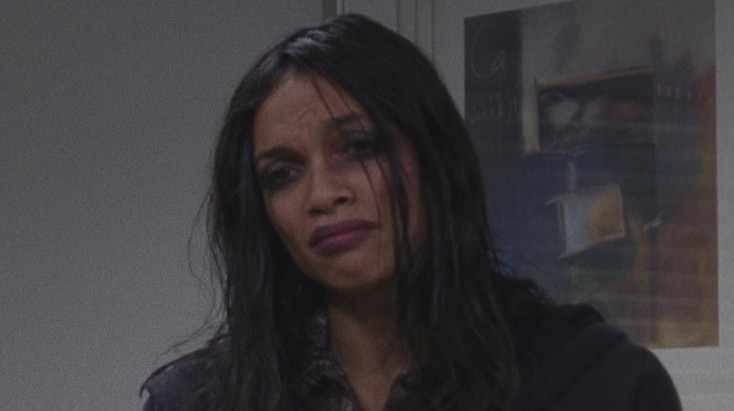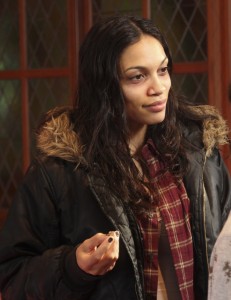By ANGELA DAWSON
Front Row Features
HOLLYWOOD—Rosario Dawson plays one of the most despicable mothers ever depicted on film in the drama “Gimme Shelter.” Drug-addicted, she is verbally and physically abusive to her teenage daughter Apple (played by Vanessa Hudgens). The film is written, directed and produced by Ronald Krauss, who spent a year at a women’s shelter researching the subject matter.
The 34-year-old native New Yorker has depicted a number of edgy characters throughout her two-decade long career, but none so unrelentingly unredeemable as June is in this drama inspired by true events. After her daughter flees, June goes after her determined to bring her back to their ratty New York drug den, just because she wants to continue getting the welfare checks she gets every month for her daughter. While on the run, Apple discovers she’s pregnant and winds up in a woman’s shelter operated by a kindly woman named Kathy DiFiore. That’s where she finds the family and love she never had at home.
Dawson, looking much more glamorous in person than the bleary-eyed momzilla she plays on screen, says it was a role she couldn’t pass up.
Q: How did you like playing such a loathsome character? You may be the meanest mama since Mo’Nique’s Mary in “Precious.”
Dawson: I was so grateful, actually. That’s what this story called for. That’s the story we were telling. When I walked on set that first day and I have this enamel on my teeth and we’re doing popped blood vessels and all that stuff, I felt a lot of relief. What Vanessa (Hudgens) and I were doing was at such odds from each other but what we were doing was so complimentary. If she wasn’t willing to go to that level, then what I was going to do was going to seem cartoonish. And if I wasn’t doing what I was doing for her, she wouldn’t have anything to rebel against. Before I did this, I was on my way to the Cannes Film Festival. Talk about indulgence! (She laughs.) All that beauty and glamour. I’m partying on yachts in a beautiful Cavalli dress and all of that. Then, all of the sudden, I’m in this motel room, barefoot and I’m attacking her. But that’s what you want to do as an actor—challenge yourself and tell stories from every single position because that’s what makes the whole process of storytelling great.
Q: Did you have to go to a dark place inside of you? Did you stay in character for inspiration or did you think about personal experiences to get to that place or are you just playing the scene?
Dawson: It always has to be that you’re playing the scene, especially when you’re working with a lot of non-actors. We were working with people who were actually girls from the shelter. We’re doing this fight scene and they’re actually fighting me and it’s like, “My leg doesn’t bend that way. (She laughs.) That’s really, really painful but I don’t want to hurt your feelings because I know how freaked out you are as well. So how do we make that work?” You have to kind of fall back on certain behaviors and things that you’ve known how to get through it. But there’s also that impossibility of not putting your own life into it.
Q: Could you relate to your character in any way?
Dawson: My mom was 16 when she got pregnant with me. I don’t know my biological father. He didn’t choose to be in my life. And then my (step) dad stepped in and married my mom when I was a year old, so I always grew up with a dad, not my biological one, but I grew up with a dad. My grandmother could have very easily been that person to say to my mom, “You got pregnant. You’re out of my house.” But she didn’t. She was mad. She was hurt. She was upset. She was disappointed. She was scared for her daughter and her grandchild. But she also kept her door open and took us in. So this is so close to home to me for many, many reasons.
Q: Do you have any experience with women’s shelters?
Dawson: My mom worked at a shelter called Woman Inc. in San Francisco when I was 10. They took in women who were abused and their children. So my mom was that stranger on the other side of that door when someone needed help and had no one else to turn to. So it was like there were so many things that were compelling to me. I grew up in New York in the ‘80s and ‘90s with the crack epidemic. I have family members who suffered crack addiction and lost their entire careers, their families, their children, everything from it. So that’s what drew me to doing this project.
Q: Are you still doing your philanthropy work with the YWCA?
Dawson: I did. For two years in a row I’ve been the spokesperson for National Domestic Violence Awareness month with Allstate’s Purple Purse campaign foundation and we were raising funds for the YWCA.
Q: So your interest in raising awareness on women’s safety predates the movie?
Dawson: Yes. My grandmother raised five kids on her own. When you’re poor especially, your kid is always on your hip. It’s not like you have a bunch of babysitters to help you. My grandmother worked for the International Ladies’ Garment Workers’ Union. My grandmother used to march for labor rights and union rights. She used to bring my mom. My mom started taking me to marches when I was little. I say, “I’ve been going to marches since Al Sharpton still wore track suits.” (She laughs.) So I kind of grew up in that. I co-founded a voting organization 10 years ago this year, Voto Latino. We do census initiatives, (get out the vote) and nonpartisan work. I’m on the board of V-Day, which is the organization founded by Eve Ensler who wrote “The Vagina Monologues.” It’s her international campaign to end violence against women and children.
Q: What other organizations are you involved with?
Dawson: I work with the Lower Eastside Girls Club. I work with Operation USA. I’m really very active with a lot of different organizations and always have been. I started my first campaign when I was 10. I wanted to try to save the trees. I was very encouraged to do all that kind of stuff. That was my childhood and I just accepted it. But really, looking back at it now and again, I find it remarkable that I even had that compulsion, that I even felt like I could make a difference, because my family, statistically speaking, had no hope. I was like, “Oh, my mom’s Puerto Rican, born in the Bronx, unmarried and having a child. Nothing to expect from you.” My grandmother got divorced, had five children she was raising on her own. There’s nothing to expect from her or her children. We were just really marginalized by society. So the fact that we’re able to be here together as a family and supporting each other and loving each other is unreal. I get to follow in their footsteps. It’s amazing to me. Literally, I’m supporting and honoring my mom’s work and taking it to the next level. That’s huge.
Q: What did you learn from the real Kathy DiFiore, who runs the shelter on which the facility in this film was based?
Dawson: Kathy was there every day and we filmed at the actual shelter. It was really remarkable. She took us around. It was incredible. In a lot of ways, it wasn’t something I felt was really my research to do on this film because June didn’t have that opportunity to recover in a shelter. She was a person who’s like, “What’s this place?” It was confronting to her. So actually all of that experience that I’ve already had with shelters I had to kind of negate. I know the history of poor people helping poor people and how powerful and beautiful that is. But my character is not someone who’s ever experienced it. Her actual idea is that the world’s against her and that there’s nothing to be expected so therefore there’s no point in even trying.
Q: Do you think this performance may change the direction of your career?
Dawson: I hope so. I’m always auditioning. (She laughs.) “Kids” came out in 1995. But for me, this year marks the 20th year I began acting. I’ve really enjoyed it and I’ve had the chance to tell all types of stories across all types of genres. That’s what compelled me to want to do this film, just for that reason. It’s just like, “I haven’t done that.” So I hope I get to continue to push myself and grow and be a better actor, because I have one of the best jobs in the world. As long as I stay lucid and I can remember a few lines here and there, I can act until the day I die. That’s an awesome thing.






